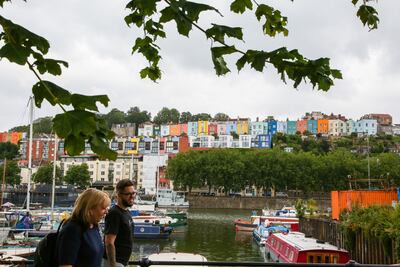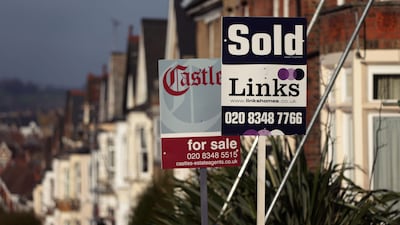Britain’s housing market was boosted by the strongest start to the year since 2005, as annual price growth increased to 11.2 per cent in January, an index has shown.
Nationwide Building Society said prices rose by 0.8 per cent from December, and across the UK the average house price was £255,556 ($344,937).
Robert Gardner, Nationwide’s chief economist, said the figures showed a 17-year high for performance in January. He said the milestone capped six consecutive months of increasing prices.
But despite getting off to a robust beginning, the market is expected to experience a slower pace later in the year.
Reduced housing affordability and the squeezing of people’s budgets amid the rising cost of living are likely to contribute, Nationwide said.
“While the outlook remains uncertain, it is likely that the housing market will slow this year,” Mr Gardner said.

“House price growth has outstripped earnings growth by a wide margin since the pandemic struck and, as a result, housing affordability has become less favourable.
“For example, a 10 per cent deposit on a typical first-time buyer home is now equivalent to 56 per cent of total gross annual earnings, a record high."
Similarly, a typical mortgage payment as a share of take-home pay is now above the long-run average, despite mortgage rates remaining close to record lows, he said.
“Reduced affordability is likely to exert a dampening impact on market activity and house-price growth, especially since household finances are also coming under pressure from sharp increases in the cost of living.”
In December, consumer price inflation reached 5.4 per cent – the fastest increase since 1992, figures show.
Mr Gardner said this was more than double the Bank of England’s 2 per cent target, and reiterated economists’ predictions for inflation to rise further in the coming months.
“This rapid rise in inflation has been an important factor denting consumer confidence in recent months, especially how people see their own personal financial situation evolving, although as yet, this has done little to dent housing market activity,” he said.
“High inflation and growing confidence that the Omicron variant will not derail the wider economic recovery has led to increased expectations that policymakers will increase interest rates further in the months ahead.
“This will further reduce housing affordability if it feeds through to higher mortgage rates, although to date a significant proportion of the rise in longer term interest rates seen in recent months has been absorbed by lenders.”
Nicky Stevenson, managing director of Fine and Country estate agents, said the “very positive start” to the year was encouraging, and there continues to be strong demand from buyers at the higher end of the market.
She said buyer demand has shot up by 15 per cent compared to last year and “competition is high”, but gave a warning of falling property prices on the horizon.
“There are early signs indicating that property will come through,” she told Sky News.
“We’re seeing valuation requests up 44 per cent on last year and we’ve estimated, or we’ve seen data that estimates, that 40 per cent of [sellers] looking at the moment haven’t actually put their property on the market yet. So, certainly over the next few months we’re anticipating more property to come on to the market which will help slow down the house price inflation that we’ve been seeing.”
Martin Beck, chief economic adviser to the EY Item Club, appeared cautious of January’s strong figures, saying they “won’t prove a taste of things to come”. He said the rising cost of living will hit the housing market over the coming months.
“Notably, the stamp duty holiday, which supported housing demand and prices last year, is now in the past. To the extent the tax holiday brought forward purchases, its after-effects may drag on housing market activity in the near term,” Mr Beck said.
“Meanwhile, the prospect of a series of interest rate rises by the Bank of England in 2022, starting with an expected hike in this week’s meeting, will translate into higher mortgage rates.
“And cost-of-living pressures faced by households from rising inflation and taxes mean fewer people will be able to afford to borrow the necessary amount they need to buy at higher mortgage rates.”


